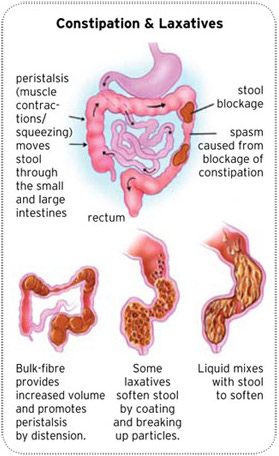10 Best Natural Laxative Foods to Relieve Constipation
 Constipation is one of the symptoms of irritable bowel syndrome, a frustrating disease that has neither a specific cause nor a treatment that can end it once and for all. IBS sufferers in the throes of constipation need laxatives that are both gentle and effective. Ideally, these laxatives made from natural products. A laxative is simply a product that allows the person to pass stool easily when they are constipated by adding fiber, helping the large intestine hold more water, increasing the motility of the large intestine or a combination of these and other factors.
Constipation is one of the symptoms of irritable bowel syndrome, a frustrating disease that has neither a specific cause nor a treatment that can end it once and for all. IBS sufferers in the throes of constipation need laxatives that are both gentle and effective. Ideally, these laxatives made from natural products. A laxative is simply a product that allows the person to pass stool easily when they are constipated by adding fiber, helping the large intestine hold more water, increasing the motility of the large intestine or a combination of these and other factors.
Natural laxatives are effective because they tend to be high in both insoluble and soluble fiber. These are complex carbohydrates that human beings can’t digest because they do not have the type of enzymes that can break them down. Because of this, fiber passes out of the GI tract indigested. Scientists divide fiber into two types: soluble and insoluble. Soluble fiber absorbs water, which creates a gel that softens the stool. Soluble fiber also regulates blood sugar levels. Insoluble fiber doesn’t absorb water but adds bulk to the stool and allows it to pass quickly through the GI tract. Fibers are almost always found in plant foods in the forms of pectin, gum, cellulose and others substances. The following are 10 of the best natural laxative foods:
1. Prunes
Everyone’s mother was right when she gave them prunes to make them regular. Prunes not only have a good amount of fiber but have sorbitol. Sorbitol is a sugar alcohol that draws water into the gut and helps the stool move more easily through the lower GI tract.
2. Flaxseeds
Flaxseeds are not only good laxatives but are helpful in treating diarrhea. They have a nice balance of insoluble and soluble fiber, so they bulk up the stool while allowing it to pass quickly, but not too quickly, down the large intestine.
3. Chia Seeds
Chia seeds are an excellent natural laxative because they are rich in fiber, especially soluble fiber.
4. Berries
Berries are abundant in both soluble and insoluble fibers. A cup of blueberries, for example, has 3.6 grams of fiber. Blackberries are even more rich in fiber. A cup has 7.6 grams.
5. Legumes
These are beans, lentils, peanuts and peas. They are even higher in fiber than berries. One cup of boiled lentils has 15.6 grams of fiber. Moreover, eating these plant foods encourages the body to produce a fatty acid called butyric acid. Butyric acid eases constipation by supporting the motility of the person’s digestive tract. It also lowers inflammation in the intestine. This is good news for people with inflammatory bowel diseases such as ulcerative colitis and may even be helpful for people with IBS.
6. Leafy Green Vegetables
These are vegetables such as spinach, mustard greens and kale. Though they are not as rich in fiber as berries or legumes, they are rich in magnesium. Magnesium is a mineral that helps the stool absorb water and grow soft enough to pass without pain. This is why magnesium is found in so many over-the-counter laxatives. Besides this, low levels of magnesium may contribute to constipation in the first place.
7. Kefir
This is a dairy product much like yogurt. It gets water into the stool to soften it. Kefir also adds bulk to the stool. It is full of “good” bacteria called probiotics that support the overall health of the digestive system.
8. Apples
An apple a day doesn’t just keep the doctor away but can ease the discomfort of constipation. Apples are rich in pectin, which is a soluble fiber that shortens the time that the stool passes through the colon by increasing the colon’s motility. Apples also add probiotic bacteria to the digestive system.
9. Olive Oil
While it does not have too much fiber, olive oil acts as a lubricant to the inner lining of the rectum. This makes stool more comfortable to pass. Olive oil also increases the motility of the small intestine. Formulas made to clean out the large intestine work better when they’re combined with olive oil.
10. Water
Plain old water is an excellent way to prevent constipation and stay regular. It naturally softens stool and enhances the action of fiber. People who suffered from constipation found relief when they increased their consumption of water to two liters a day over a two month period.
Constipation is a misery to those IBS patients who suffer those periodic bouts of it. Fortunately, there are many natural laxatives that ease it. These laxatives act gently and do not cause the dependence that can happen through frequent use of over-the-counter medications.